
Surah At-Takwir is a Meccan Surah with twenty-nine verses. At-Takwir means The Folding Up. It is derived from the word kuwwirat in the first verse.
The subject matter and the style clearly show that it is one of the earliest Surahs to be revealed at Makkah.
It has two themes:
The Hereafter and the Institution of Prophethood.
In the first six verses the first stage of the Resurrection has been mentioned when the sun will lose its light, the stars will scatter, the mountains will be uprooted and will disperse, the people will become heedless of their dearest possessions, the beasts of the jungle will be stupefied and will gather together, and the seas will boil up.
Then in the next seven verses the second stage has been described when the souls will be reunited with the bodies, the records will be laid open, the people will be called to account for their crimes, the heavens will be unveiled, and Hell and Heaven will be brought into full view.
After depicting the Hereafter thus, man has been left to ponder his own self and deeds, saying: “Then each man shall himself know what he has brought with him.”
After this the theme of Prophethood has been taken up. In this the people of Makkah have been addressed, as if to say “Whatever Muhammad pbuh is presenting before you, is not the bragging of a madman, nor an evil suggestion inspired by Satan, but the word of a noble, exalted and trustworthy messenger sent by God, whom Prophet pbuh has seen with his own eyes in the bright horizon of the clear sky in broad day light. Whither then are you going having turned away from this teaching?”
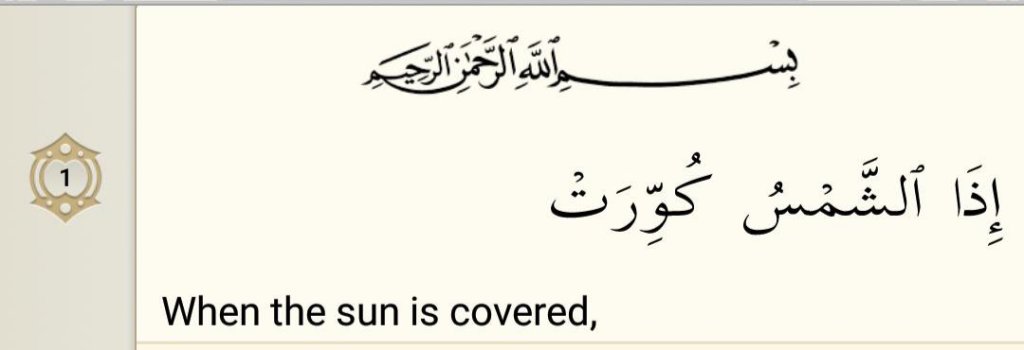
Surah Takwir starts with some conditional statements which covers the first thirteen verses, and then verse fourteen provides response to those conditions (Jawab-ul-qasm).
The first one states that When the sun is darkened…
Kuwwirat comes from the word takwir and literally means to wrap something up and is used specifically for turbans. Takwir al-amamah is generally said for folding up the turban on the head, the way we wrap it and cover the entire head. The idea is that the light of the sun is stretched out and is compared to the long stretched cloth of the turban that gets folded up just like Allah will fold up the light on the Day of Judgement. When a turban wraps the head, the head gradually becomes invisible. So, the day sun will lose its light gradually and it will darken.
This is a matchless metaphor for causing the sun to lose its light. It is also interpreted and understood that the sun itself will look like it has been folded up and covered up.

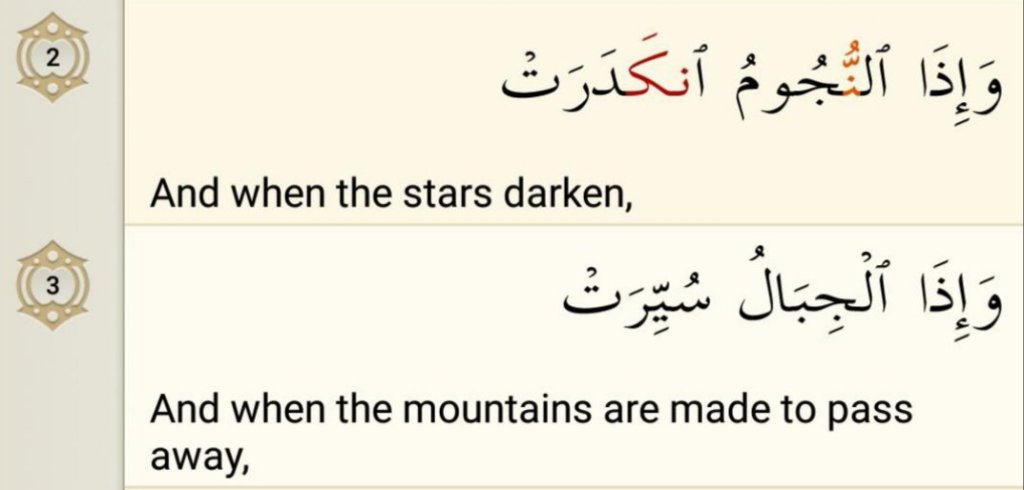
And when the stars fall…
Inkidaar means to lose colour or brilliance. So, the stars will become dull. At the threshold of the Hereafter, the stars will both lose their light, scatter and fall, and also the regularity of the Universe will be disturbed. When the force which is keeping them in their orbits and positions is loosened and all the stars and planets will scatter in the universe. The word inkidar also indicates that they will not only scatter away but will also grow dark.
And when the mountains shall be set in motion…
It is understood from various verses of the Quran that close to the time of the occurrence of the Resurrection the mountains pass through different stages: at first they move, and, in the end change into scattered dust. The earth also will lose its force of gravity because of which the mountains have weight and are firmly set in the earth. Thus, when there is no more gravity the mountains will be uprooted from their places and becoming weightless will start moving and flying as the clouds move in the atmosphere.

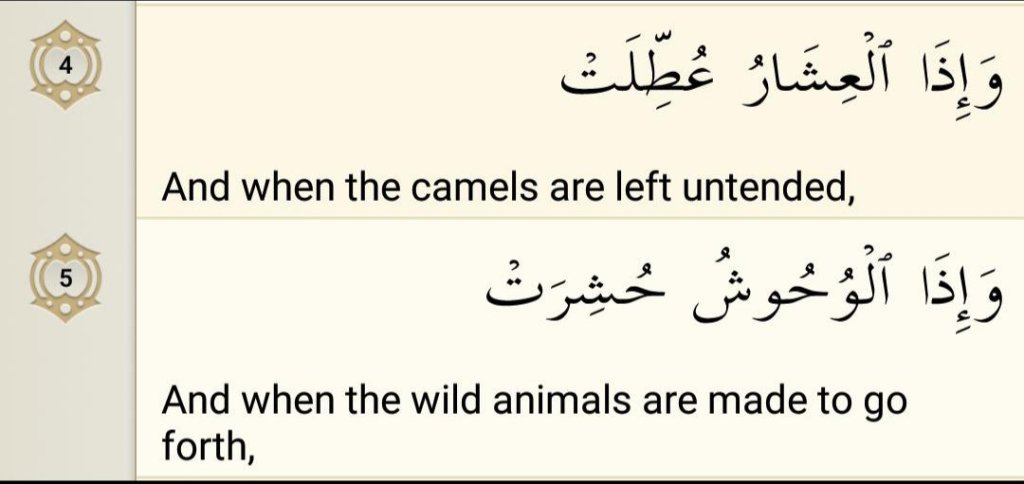
When the camels are left unattended…
Ishaar in Arabic is the plural of o’shara which are the she-camels that are ten months pregnant and this comes from a’shara which is the number ten. This was very important to the Arabs as it was the most precious and honoured of wealth with them and a source of great pride. At the time of the revelation of these verses such a camel was considered the most valuable property to the Arabs. Allah says that these will be o’ttilat. A’tala means to become useless or to be neglected or to leave without care.
It means that the intensity of the horror and fear, on that Day, is so much so that everyone leaves his most precious things unattended. This precious asset that normally has security surrounding it, a rope on it, branded with it’s owners name, being taken care of and a precious asset not to be left alone on that Day will be rendered useless to him when he sees what is happening around him and it will be let go of.
When the wild beasts shall be mustered…
There are some animals which normally live far from each other and fearing each other, flee, but the terror and the alarm of the events, prior to the Hereafter, is so great that these animals will gather together and forget every fear. It seems as if they feel safer gathered together.
Consequently, a lot of commentators believe that this verse refers to the Resurrection of the wild animals and their presence in the Court of the Hereafter. They will he judged on their limits and according to their knowledge which relates to their own responsibilities, and will be recompensed if they transgressed.

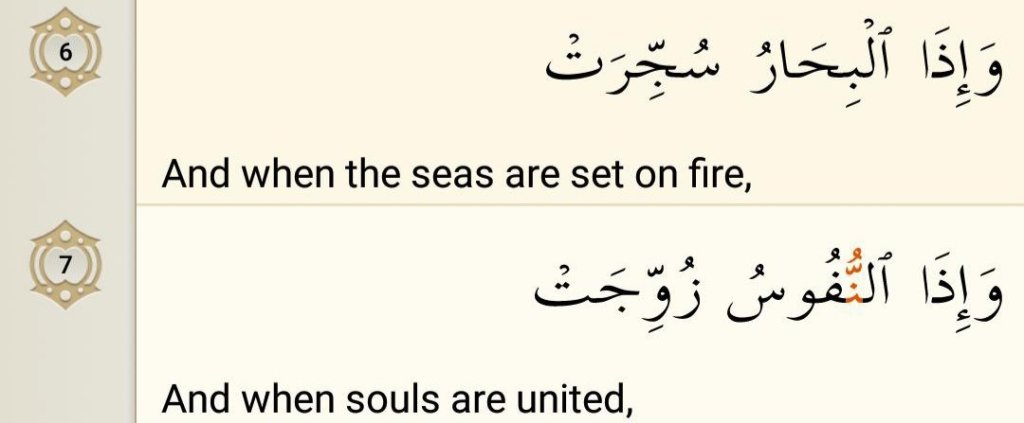
And when the seas boil over…
The term sujjirat is based on tasjir which originally means ‘to light fire and to inflame the fire’. In the old days this meaning seemed odd to the commentators, but today it does not, because now we know that water is formed by Oxygen and Hydrogen; both of which are flammable. It is not improbable that at the threshold of the Hereafter the water of the seas and oceans will be under such conditions that these two elements separate and turn totally into fire.
The implication of this is that the water of the ocean will actually turn into fuel for a fire. Or it could be that the earthquakes and the cleaving of the mountains asunder, nearly at the time of Resurrection, may cause the seas to fill and overflow, or meteorites to fall into them and their water flows over land, and then, everything would sink.
When the souls are reunited (like with like)…
The good‑doers with the good‑doers, the evildoers with the evildoers, the companions of the Right Hand with the companions of the Right Hand, and the companions of the Left Hand with the companions of the Left Hand, all will be like with like, in contrast to the world, today, where all of them are mixed. It sometimes happens that in the neighborhood of a believer there is an unbeliever, or the spouse of a good‑doer is a wrong doer.
But on the Day of Judgment, which is also a ‘Sorting Day’ and ‘a day of separation’, these groups are quite apart from each other.
In commenting on this verse, some other probabilities are also suggested including the following:
1) the souls return to their bodies
2) everyone will, again, be with his intimate companions after death has made them separate
3) everyone will unite with one’s deeds.
However, the first commentary seems to be the most appropriate among all of them.

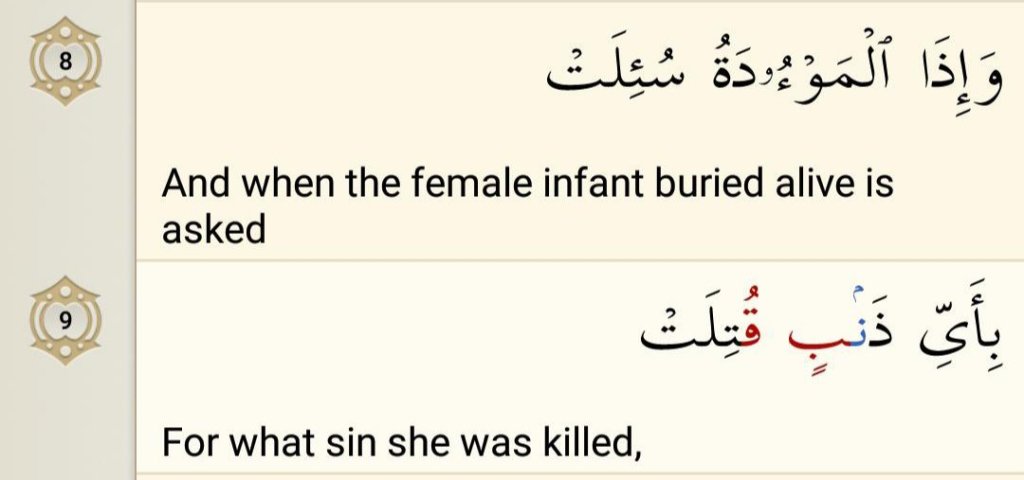
The Practice of Female Infanticide
One of the most dreadful practice of the pagan Arabs was female infanticide, which is made reference to repeatedly in the Quran. When their wives were going to give birth, used to dig a hole and sit above it waiting for the child to be born and then bury her if it was female, and keep him if it was male.
The cause of this crime had various reasons:
1. The lack of value for women, in mankind by the pagan Arabs.
2. The problem of poverty among those people, especially, because females could not be as economically productive and beneficial as males.
3. Also, that in the numerous quarrels between the tribes, of that time, women would be captured by the enemies which brought disgrace on their men.
All of these excuses were seen as justified for committing this crime. These factors contributed to the terrible custom of female infanticide.
But unfortunately this cruelty is also seen in modern societies in the form of ‘the freedom of abortion’ by which fetuses are legally cast‑off in many civilized countries. The pagan Arabs used to commit infanticide after delivery, but these civilized people of our time, kill them in their mother’s wombs and under the cover of miscarriage.
It is noteworthy that the Quran condemns this action and counts it so disgraceful and hateful that it considers the crime of prime accountability prior to the Records in the Hereafter. Another point, which is also noteworthy here is that the Quran does not say that the murderers will be asked of what crime they committed, but it says that the innocent female‑children will be asked about what sin it was for which they were slain so cruelly. It seems that the murderers are not worth questioning. Besides that, only the testimony of the murdered ones is enough.

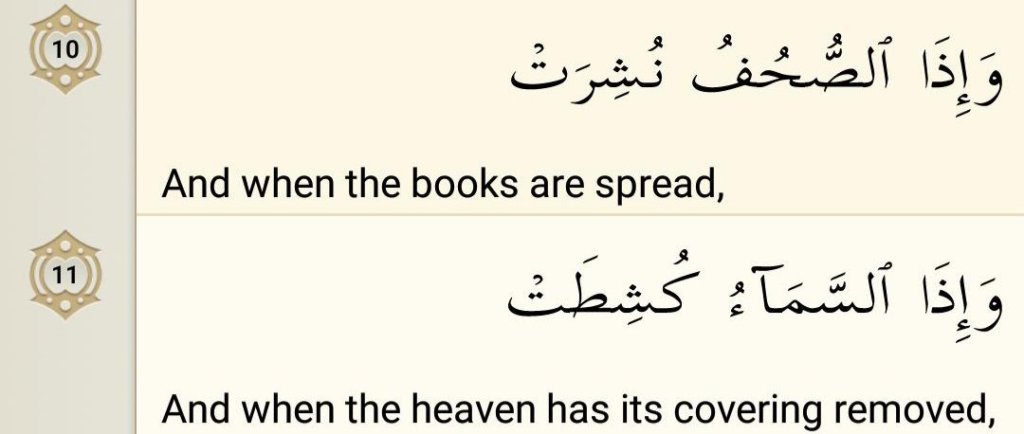
When the records are laid open…
This refers to the scrolls enclosing all of man’s deeds. Anshara means to spread out and also means to bring to life. Thus, it will be as if the scrolls (which are the scrolls of deeds that have been recorded) are spread out and brought to life and the contents within brought to life for man’s accountability.
When the sky is stripped off…
Samaa literally means that which is above but commonly means sky. The word kushitat comes from the word kashata. To skin the camel once it is slaughtered is kasht, kashaat is a butcher and kishaat is the peeled skin itself. This verse could be taken literally by understanding that the sky has a skin that is peeled. However, it is more appropriate to understand the imagery here. Allah in another place in the Quran mentions the sky on the Day of Judgement will be red. When you peel the skin of an animal the red flesh is exposed so this illustrates how red the sky will look, so red it is as if the skin of the sky has been peeled. The sky will look red as it will reflect the vicious occurrences on earth that day.
Also everything which is hidden from view now will become visible. Now one can only see empty space, or the clouds, hanging dust, the moon, the sun or stars, but at that time the Kingdom of God will appear in full view before the people, without any veil in between, in its true reality.

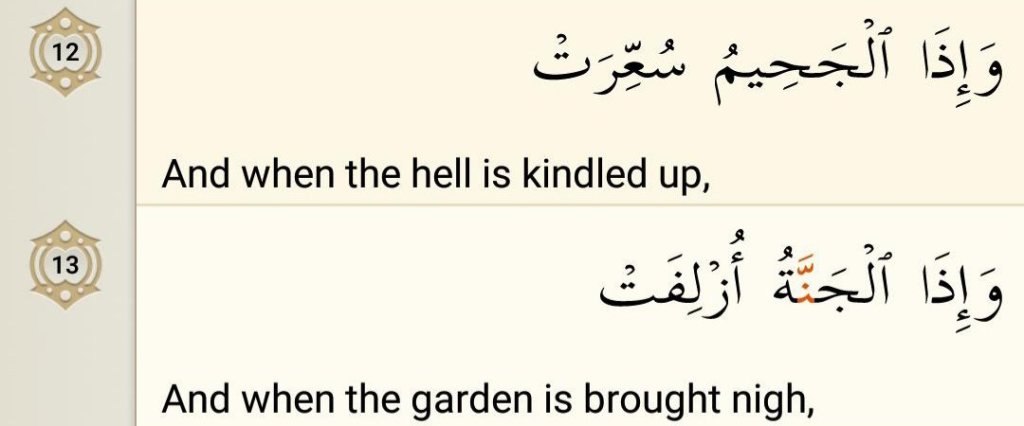
When the hellfire is set ablaze…
The word sa’ara is to cause a fire that towers high. So the jaheem, this vicious glaring hellfire, is given towering flame. This fire towers so high that its redness even affects the texture of the sky making the sky look as if has been peeled.
When paradise is brought near…
The word uzlifat means ‘nearness, proximity, a near approach’. It is worthy to note that Allah does not say that the Righteous approach Heaven, but it says ‘Heaven is brought near for the Righteous’ and this is the most honorable situation possible in this case.
Heaven and Hell are present just now but, on that Day, Heaven is brought nearer and Hell is set more ablaze.
In other words this verse talks about paradise being brought close in order to honour the believers. So paradise has been depicted as an honorary gift to the believers. When Allah talks about Jannah we often think He is talking to the believer but here He at the same time is reprimanding the disbeliever and making clear that in fact the honour is coming to the believer.
Summarised simply, in the Plain of Resurrection, when the hearing of the cases of the people will be in progress, the blazing fire of Hell also will be in full view, and Paradise also with all its blessings will be visible to all, so that the wicked should know what they are being deprived of and where they are going to be cast, and the righteous as well should know what they are being saved from and with what being blessed and honored.


This verse is a response to every verse that came before it. After witnessing every calamity man is concerned and preoccupied with what he has to present of his deeds as he realises now ‘I know what’s coming’ and all he can think of is himself. Every person shall know what it has put forward of good and evil. Everyone knows full well what actions they need to present. This is not a difficult to imagine concept as everyone already knows this deep inside.
This follows on from the previous Surah where Allah gives man the opportunity to fix himself but he does not and so in this Surah, Allah is essentially saying ‘You know what’s coming now’. The word hadara means to present itself or to be present. Ahdara means to take something and bring it for presentation and it includes the implication of forcing i.e. a reluctant presentation. Even the believer will be nervous on the day until the scales have been counted.

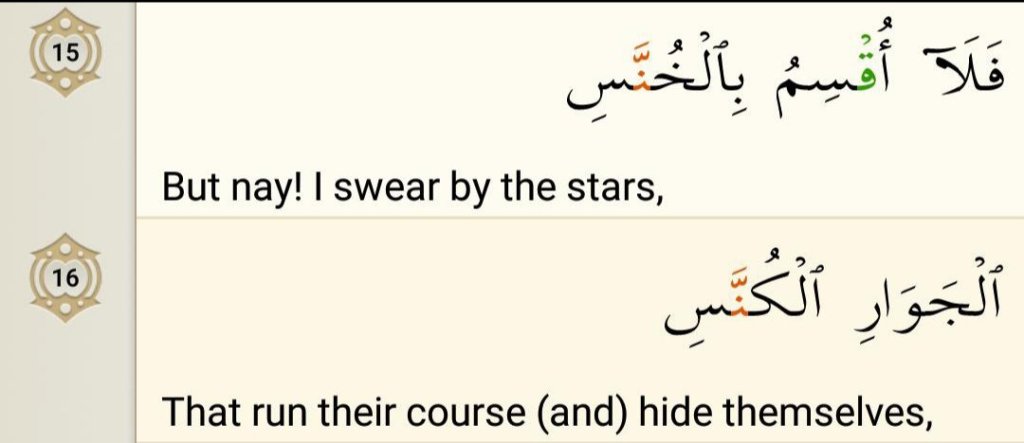
The upcoming verses will speak about the importance of the Quran, showing how the Quranic Revelation is true, was revealed through the angel Jibreel, and was not merely a self made speech from any possessed being. For this Allah swears by few oaths.
Frist Allah swears by
Al-Khunnas, Al-Jawar Al-Kunnas. These are the stars that withdraw (disappear) during the day and sweep across the sky (appear) at night. Khunnas means to shrink, hide away. Jawar means running, to veer off path and Kunnas means to lie in hiding.
If we look to the sky over several nights in succession, we see that all of the stars gradually appear but they sit all together without having apparent change in the distance between them. It looks like a piece of black cloth on which a great number of pearls have been sewn having defined spaces, and the cloth is pulled up from one side and taken down from another side depicting day and night.
The kuffar thought certain things were bad omens and superstitions. One of these superstitions was to do with the stars. The twinkling nature of stars led the pre-Islamic Arab to think the stars were trying to tell him something, for example meteors or shooting stars were considered a sign of something. For many people also today astrology is a big business. They would say that they would get information about the future from shayateen that would go up to the heavens and stars and find out things. One of the accusations levelled at the Prophet pbuh was that he also was a mind reader and gets information from the stars.
Allah here goes to their apparent source of knowledge, the stars, and swears by them. It is Allah who has full control over the system of stars and it is He who controls their appearance and disappearance.
The Arabs believed that the Jinn gets information from the stars but we learn that when the Jinn or Shayateen try to steal information from the angels they are shot down with stars. So what the Arab or astrologer today thinks is the Jinn getting information is actually the Jinn getting a beating. This oath will be connected to its subject as Allah makes it clear that what Prophet pbuh is conveying, is not any fraction amount of what fallacy the disbelievers believed in!
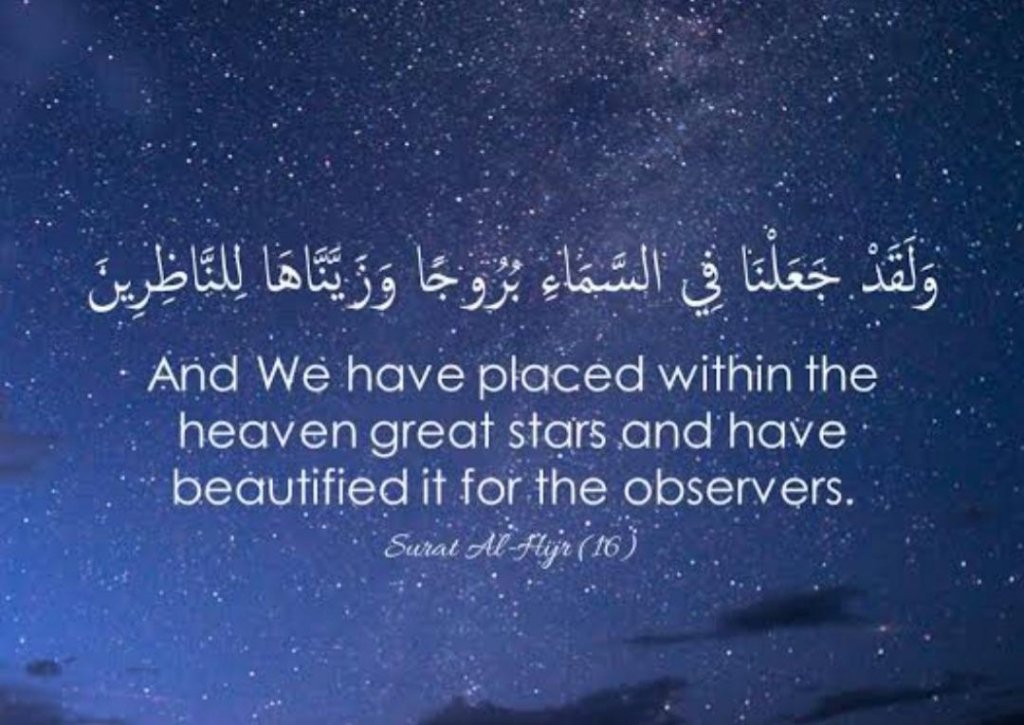
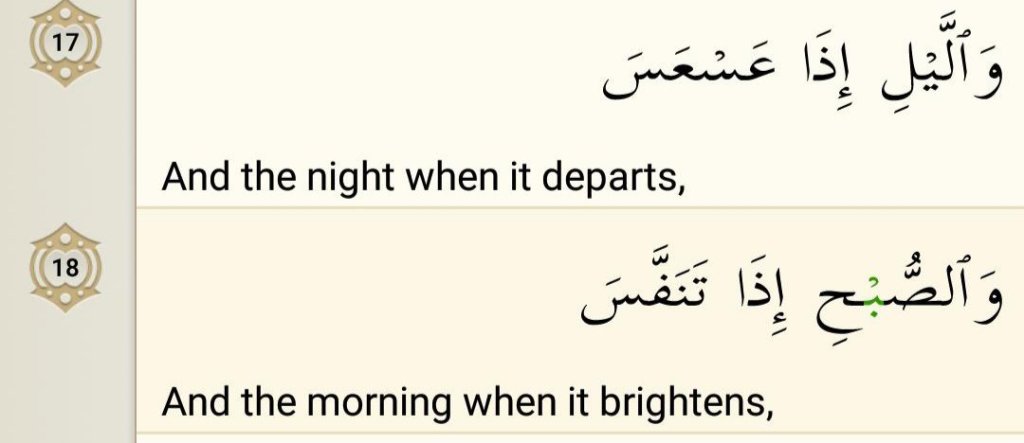
Now Allah further swears by the night as it departs. The word as’asa is used for the night when the evening is starting and also when it is ending because these are times when the vision is blurry. At these hours one cannot see the sky.
Night is one of the great gifts from Allah, and it is both the cause of man’s spiritual and bodily tranquility, as well as an adjustment for the Sun’s heat and consequently, the continuation of vitality in living creatures.
The emphasis put on ‘the end of night’ may be for the reason that night moves toward light and brightness and it is the best time for praying to and the worshipping of Allah. Dawn, in this world, is the beginning of movement and struggle for living creatures.
Then Allah swears by the morning when it breathes. What an interesting analogy! Morning resembles a living creature whose first breath is dawn and blows vitality into all creatures, as if it had been captured in the grip of night and now with the first glow of day, becomes free and breathes.
It is as though the gloom of night like a veil, has fallen on the face of morning which is removed now, at dawn, and the morning’s glittering face, which is a sign of life, is shown to all in this world.
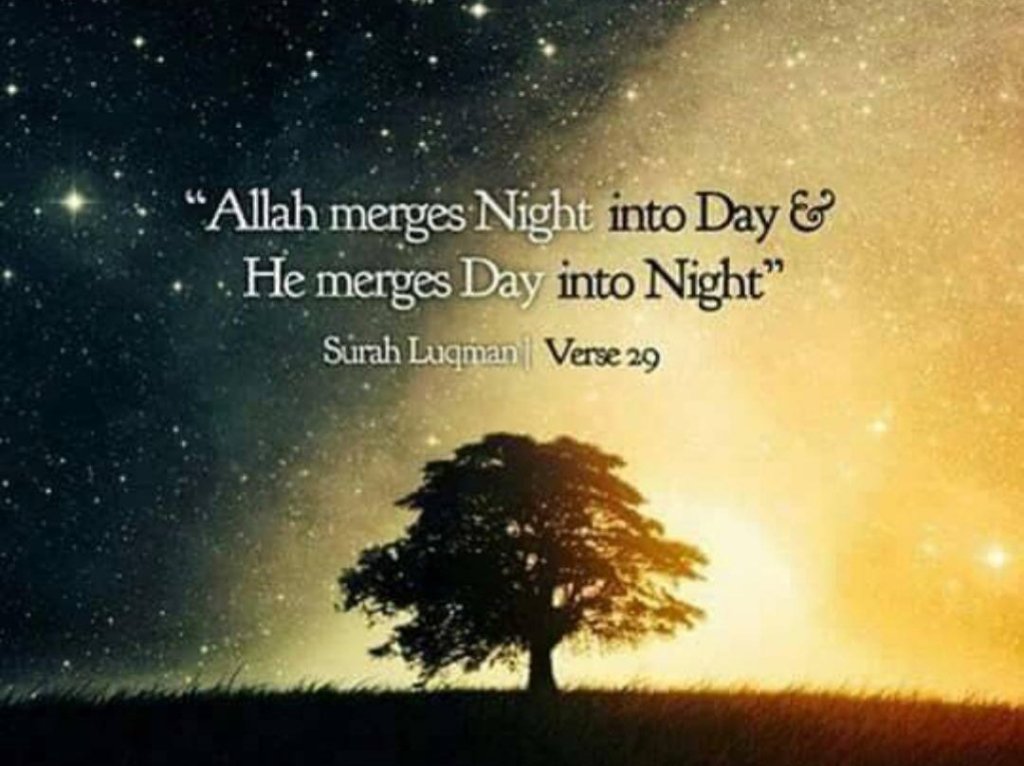
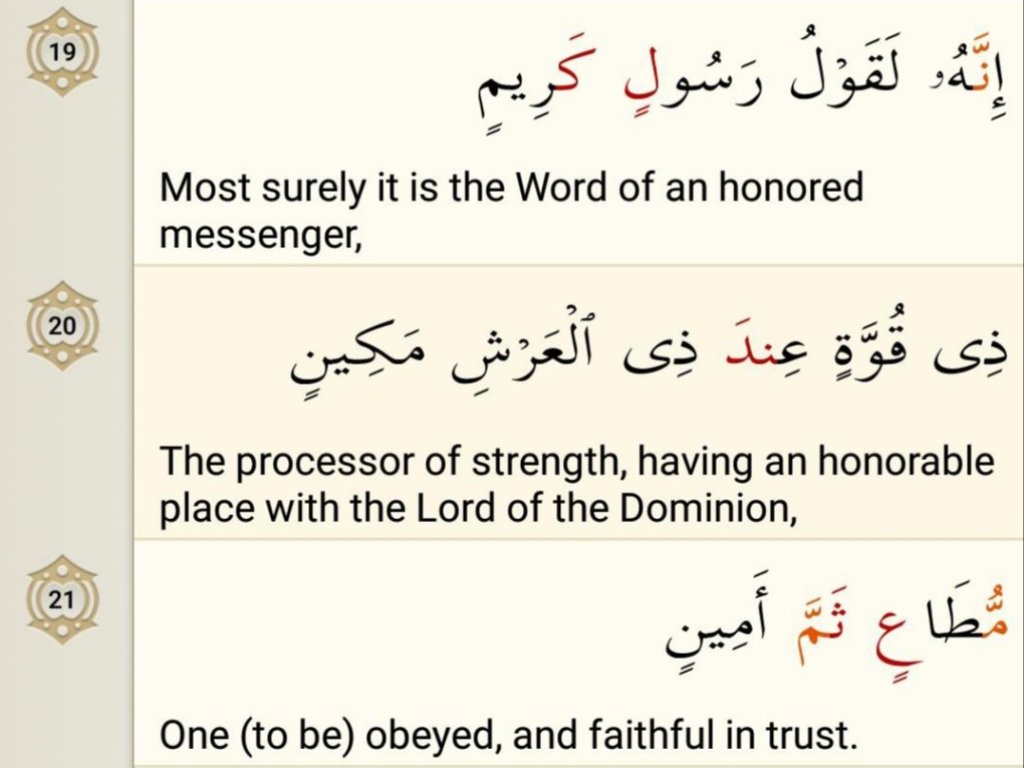
This is he subject for which the oaths have been sworn. The oath means: “Muhammad pbuh has not seen a vision in darkness, but when the stars had disappeared, the night had departed and the bright morning had appeared, he had seen the Angel of God in the open sky. Therefore, what he tells you is based on his own personal observation and on the experience that he had in full senses in the full light of day.”
This verse is an answer to those who accuse the Prophet pbuh by saying that the Quran is from him; not from Allah.
In these verses there are five characteristics mentioned for Gabriel, the courier of Allah, which are necessary, indeed, for any qualified messenger:
1. He is honorable
2. Processor of strength
3. Honorable status with Allah
4. He is obeyed
5. Faithful in trust
Jibreel a.s is honorable and gracious which shows his worthiness. Verily, he is a worthy creature with Allah, the Great. This Quran with its description of the Day of Judgement & all Deen is the word of a noble and mighty messenger, i.e. Jibreel, the angel who carried and delivered it to Prophet pbuh.
He is endowed with power, taking such a great Message and carefully communicating it needs a great power. And, as a matter of fact, any messenger should have an authority fitting with his mission or the message He must be especially free from any forgetfulness of the message that he is responsible for. Allah says of Jibreel that he is situated right by the possessor of the throne, thus Jibreel has high status due to where he is situated.
He is the One (to be) obeyed and moreover he is faithful in trust. Jibreel has an angelic authority among angels and is obeyed there and beyond these, he is faithful to his trust in conveying the Message. He is Ameen which means especially trustworthy. This is important as the deliverer of the revelation must be trustworthy and so the message is delivered using only the most trustworthy means.
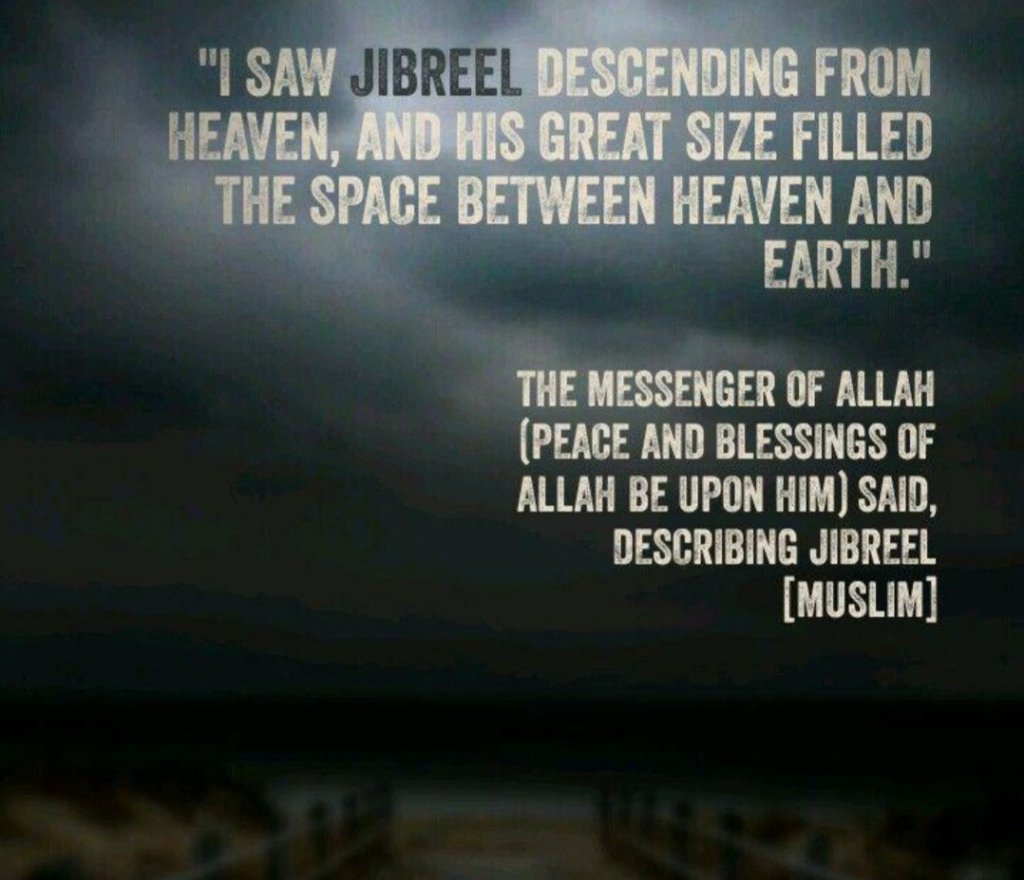
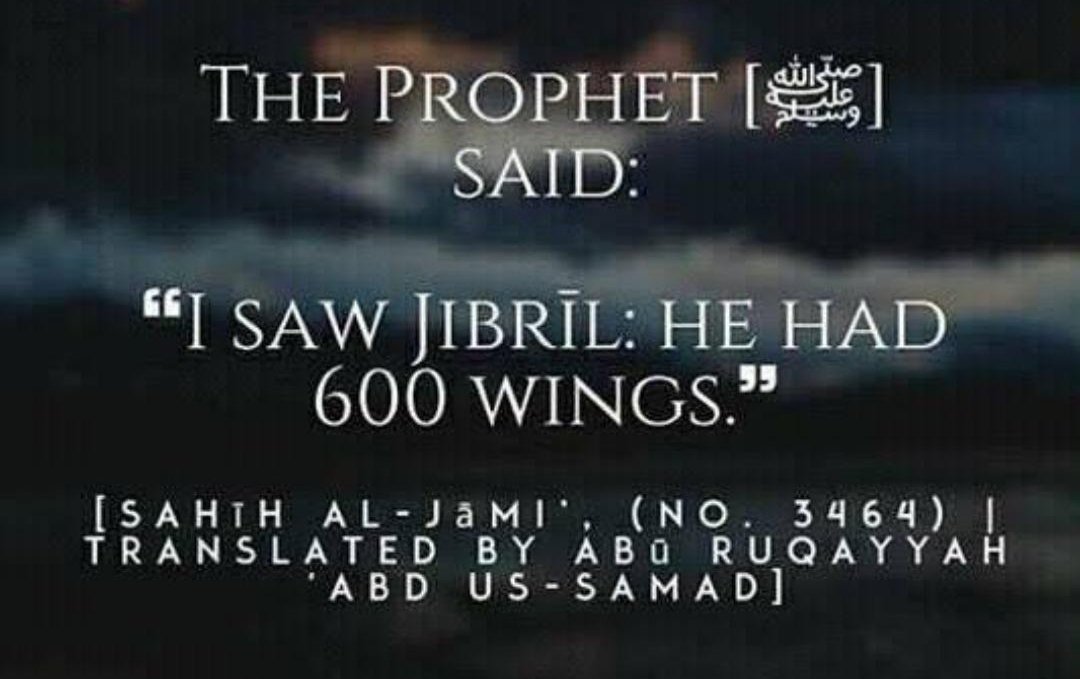
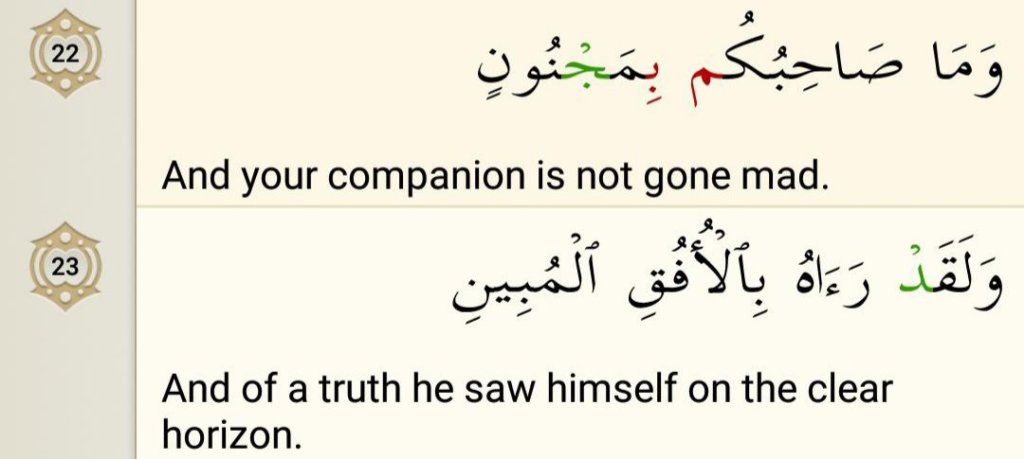
There is a shift now and Allah is talking to the disbelievers (Ahle-Makkah). Allah does not say Muhammad pbuh is insane. He says your companion is not insane. Saahib in Arabic means the one who accompanies you in space and time and illustrates that he has lived among your midst, you know him, where he lives and have been physically close to him and he has been among you for a long time. And this is how you get to know someone, when you live close to someone or you spend a lot of time with them. Allah is saying that as the Messenger has been amongst your midst a very long time you know very well he is not insane, or a mind reader and of the very evil attributes you prescribe to him.
Mujnoon has two implications, the first is the one whose intellect has been overshadowed or covered and he cannot make sense of anything and thus he is called insane. The second implication is someone who is possessed by a jinn. So, Allah is saying he is not possessed by a Jinn and also implies he is not getting his information from a Jinn or is inspired by them. Rather he gets them from Jibreel who delivers them from Allah.
The word ufuq literally means a corner, so the far horizon where the earth and the sky meet. From there the clearest part was where Prophet pbuh saw Jibreel. So he is not insane but he actually saw this happen. It is said that the Prophet pbuh saw Jibreel a.s in his original form twice, once at start of his prophetic journey and secondly on incident of Miraaj.
Hazrat Aisha r.a has reported that the Prophet’s saying to the effect:
“I have twice seen Gabriel in his real shape and form: his glorious being was encompassing the whole space between the earth and the heavens.”
(Muslim)
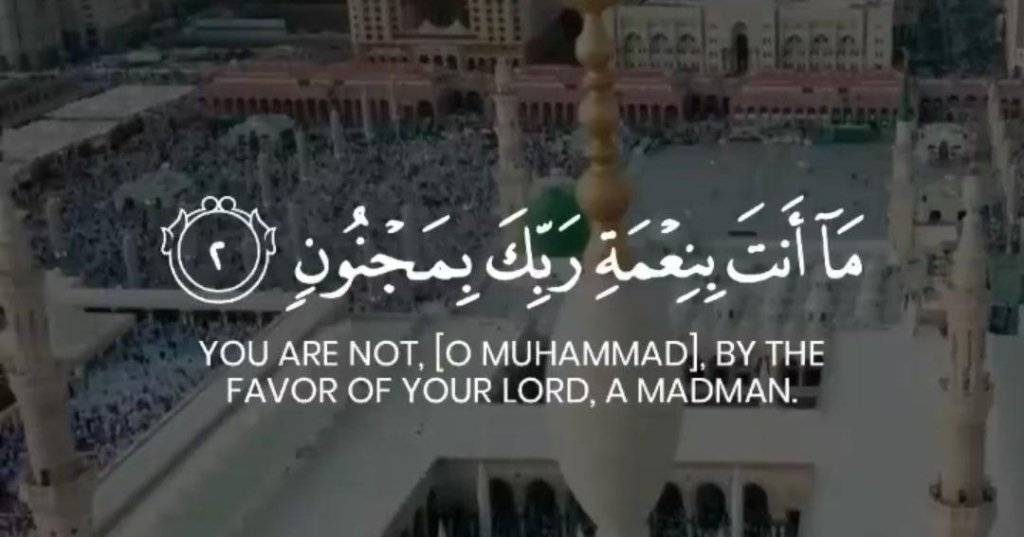
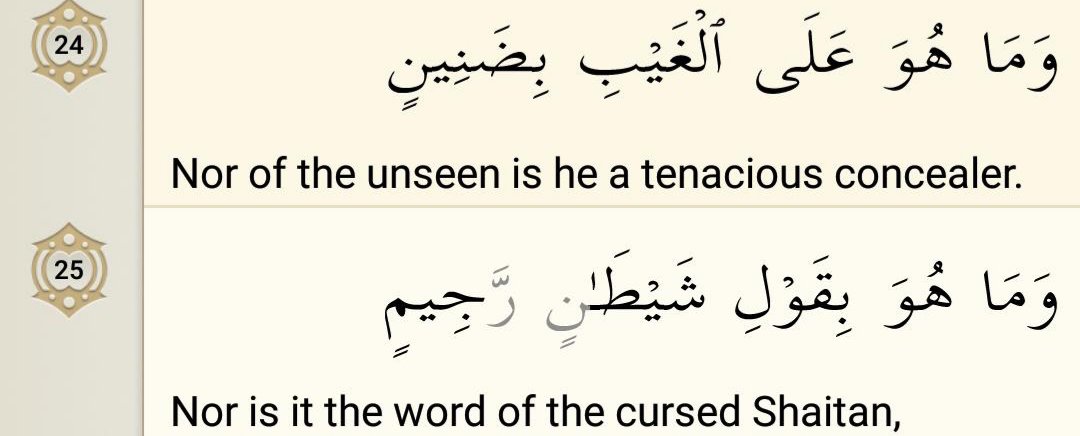
Allah says that Prophet pbuh does not withhold anything concerning the unseen. Whatever he has, he puts it within the reach of the people. He is not like those who insist on keeping secret an important fact which the, have gained and is in their own control and it sometimes happens that they withhold it until they die.
The Prophet pbuh is not such a person. He gives what he has received, as revelation, to all the needy and even to those who stand in opposition to him and value him naught, in hopes that they may be guided to the right path.
The term danin means ‘stinginess for the precious things’, which is a characteristic that Prophets never have, because the source of their knowledge is Allah; Who is infinite.
These Quranic verses are not like the statements of necromancers and soothsayers who take them from the devils. Those statements are full of lies and mistakes, and based on their own wishes, which come with envy, spite, greed, or other vices but these verses are full of clear truth, under divine inspiration whose signs are apparent in them.
These two are completely different from each other, of course. It has been shown that the Quran is not the word of a mortal, but that it is full of divine wisdom; that its teaching is not that of a mad man, but from one sane to the core and in accordance with human needs.
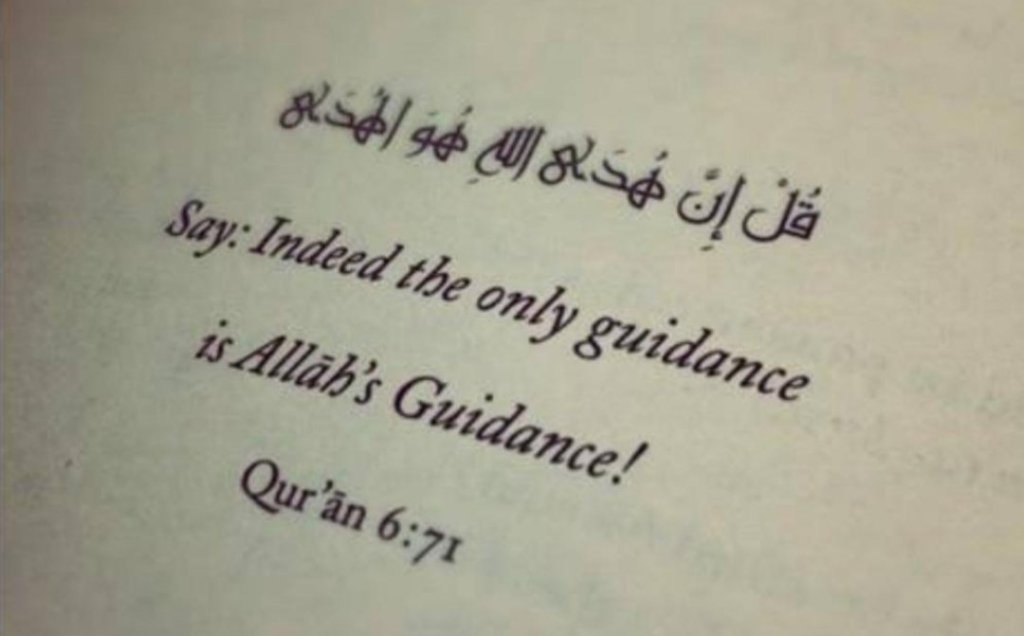

O Neglectful Ones! Where Are You Going?
In the previous verses it was made clear that the Quran is the word of Allah. Its contents show that it cannot be from a devilish source, but from Allah, the Merciful, from Whom Jibreel a.s the powerful, faithful carrier of Allah’s revelation, brought it to the sane Prophet pbuh who communicated and taught it, completely to people and did not withhold anything of it.
The following verses condemn the rejecters for their disobedience to this great word, the Quran. It reproachfully questions:
“Whither then will you go?”
Why have you left the straight path and gone astray? Why have you turned your back to this leading bright torch and gone toward darkness? Are you against your own happiness and safety? Even generally if we see this verse, imagine its Allah asking man with such deep concern what made man deluded from this beautiful path of truth, where is he going!

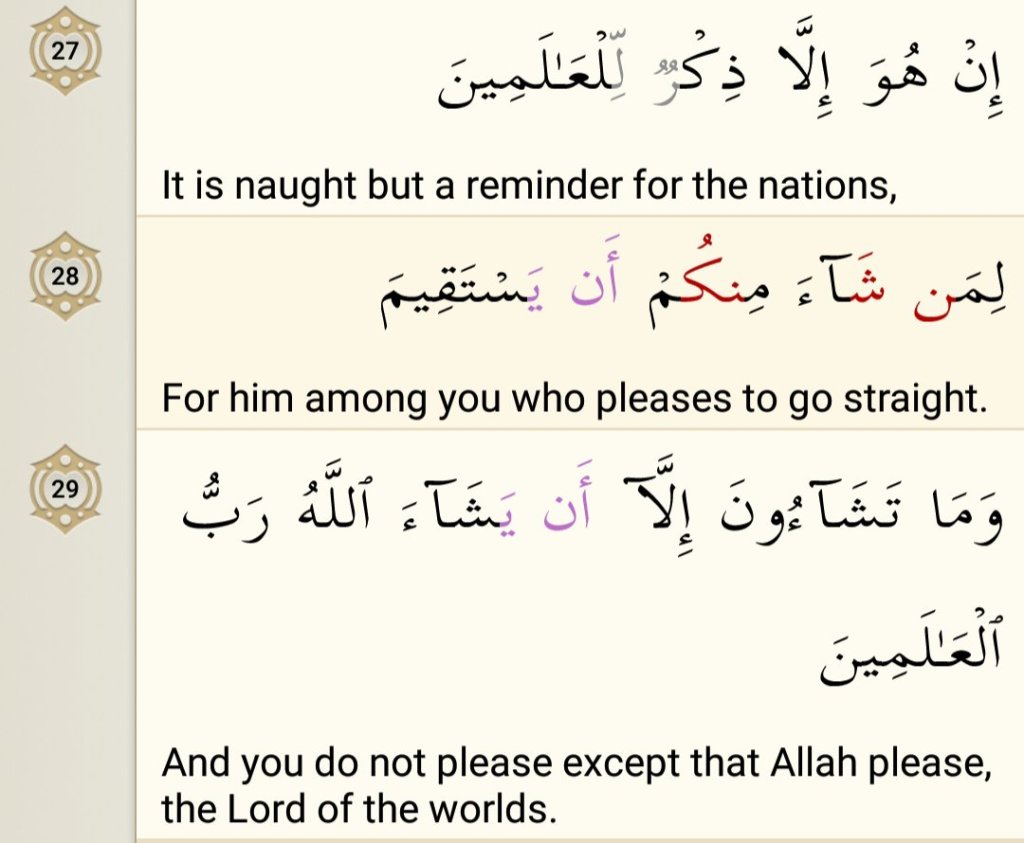
Allah says that this Quran is nothing but a reminder for the worlds. This is a message for the whole world. The word alameen refers to the creatures of intellect i.e. mankind and jinn. Thus, in the Quran whenever this word is used it is referring to nations. This illustrates that the Quraysh can go away. The message does not need them; there are other people out there.
It is noteworthy that the former verse says that the Quran is a reminder to all the worlds, but the next verse says that it is for a special group of people; those who have decided to assume the truth and go on the straight way. The reason for this difference is that the first verse speaks about the generality of this divine gift, while the second one states the conditions for obtaining benefits from it. And all the blessings in the world are the same: they are basically general, but their usage depends on ‘will’ and ‘decision’.
The term yastaqim is used with an interesting sense which shows that the main road, the one in front of man, is the straight way to happiness and salvation and other roads are the false ones leading to aberration. All of man’s talents, along with his hidden and apparent powers and his natural capacities, are equipped so as to help him move forward on the straight way. When going to extremes, devilish temptations, and misleading paths do not interfere. Man, with the help of his nature, follows along the straight way, and we know that the straight way is always the nearest path to the goal.
It is possible, however, for man to imagine that this free‑will is so infinite that he can do whatever he wishes and that he is not in need of Allah’s help to follow the straight way. But, on the other hand, it says:
“You cannot will, except as Allah wills.”
It means that you are created free, but this free‑will is from Allah and He has willed that you be so. Man is neither obliged nor completely free in his deeds. Neither ‘fatalism’ nor ‘infinite freedom’ is correct. Whatever man possesses out of wisdom, intelligence, bodily ability and mental capacity for making decisions, all in all, are from Allah. It is this very fact that requires man to be in need of Him and, due to his freedom and his free‑will, to be responsible for his own duties and actions.

